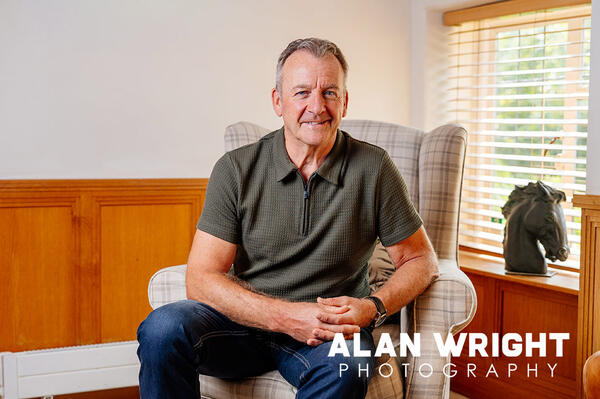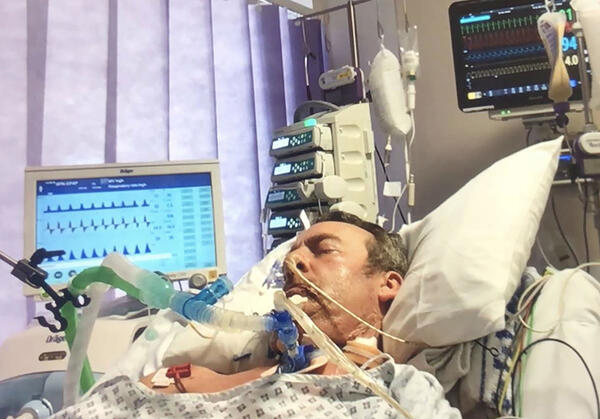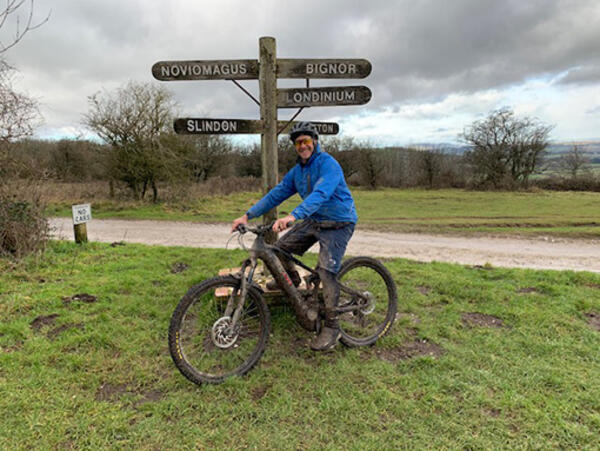COVID SURVIVOR LAURENCE PENN

Published on 1st September 2025
Laurence Penn from Thakeham was a fit and healthy 54-year-old until his life was turned upside down by Covid. Having spent nearly a month fighting for his life, he now since analysed his own treatment and recovery for a newly-published book, Bed No.1. Here, Laurence describes his remarkable journey…
For most of my career, I have specialised in IT and Telecommunications Recruitment, working with many global corporations. When I think back to early 2020, I can recall the growing murmurs of an outbreak of Covid-19 in China. I twice travelled to Dubai to discuss the increasing threat posed by the pandemic as – like all businesses – we were making contingency plans to ensure we survived.
Early in March 2020, several weeks before the first lockdown, I met with a colleague. He had recently returned from Africa and was clearly unwell, sweating profusely throughout the meeting. I suggested that he rest at home, which he did. However, I suspect this is how I contracted the disease. I started feeling unwell, but didn’t think it was Covid and believed I would quickly shake it off. That weekend, I went for my regular dog walk from Sullington Church to the South Downs. Normally, it’s an easy, pleasant stroll, but on this occasion, I struggled with the slopes and was exhausted when we returned home. I fell straight to sleep on the living room carpet.
I tried sleeping it off, but a cough became progressively worse and I developed a fever. Sometimes, I was wearing a ski jacket under the duvet, yet still shivering. I was taking paracetamol but stubbornly refused to seek medical attention. My wife, Martine, finally insisted on calling the NHS hotline, as by now the global situation had changed and people were beginning to grasp the seriousness of Covid. They asked me to carry out a simple test over the phone: take a deep breath and count to 10. I reached four then started to cough and struggled to breathe. It wasn’t long before an ambulance arrived outside our home.

The paramedics were wearing protective clothing and looked like they had stepped off a spaceship. It was like the scene with the contaminated sock in Monsters Inc. But they were fantastic and took me to Worthing Hospital after a test revealed my blood oxygen levels were dangerously low. I was admitted on 31 March 2020, when the number of Covid-related deaths were still low and specialist units had yet to be established.
I remember being surrounded by medics as I was transferred to a high dependency unit. My respiratory problems were serious enough for me to need an oxygen bubble to aid my breathing. This and other medication contributed to my chilled-out state-of-mind. I still believed I would be discharged within a few hours and even sent Martine a selfie, saying I was okay and would be home soon. I wouldn’t return home for 47 days.
I was put in bed number one at the ward and believe I was the first patient at the hospital to be placed in an induced coma for Covid. My recollections from those 29 days border on the hallucinogenic and I’m unable to differentiate between dreams and reality. There are snatched moments of consciousness, before you dive back into a trance-like state. It’s a hard thing to describe, but I did experience a feeling of being driven towards an energy and light, yet at the same time I was aware that I was somewhere I shouldn’t be. I was in trouble and had to fight for life.
It is only once you are weaned off the drugs that you begin to grasp the reality of the situation, although I remained in a state of great confusion as to where I was and what I was doing there. I had to come to terms with the fact that I had been sleeping for a month, which seemed crazy. It was only later that I learned how much the world had changed and how lucky I had been; about 150 others at Worthing Hospital died of Covid while I was there and sadly their loved ones couldn’t be at their side, due to lockdown restrictions. My wife and daughters went through an awful lot too. On two occasions, Martine was told that there was a good chance I wouldn’t survive, yet she wasn’t allowed to visit.
I later interviewed Dr Luke Hodgson, an intensive care and respiratory consultant who treated me. He provided fascinating insights into that period. Often, doctors had to make quick decisions concerning clinical treatments, as they battled to save as many people as possible. I was an interesting case, as I had been a fit and healthy 54-year-old who trained in jujitsu and enjoyed mountain biking and racquet sports. They were puzzled as to why Covid had affected me so badly, when it had been thought to target the elderly or those with underlying health conditions. So, the medical staff had a vested interest in helping me recover.
New drugs were being made available all the time as pharmaceutical companies focused on treatments and vaccines. My wife enrolled me for several clinical trials in the hope they would help me. One treatment was Proning, where patients with hypoxia (low oxygen levels) are placed on their stomach to help spread oxygen to the lungs. Not all the drugs worked and sometimes my body resisted them, but they helped keep me alive. Doctors were high-fiving me and offering congratulations, but it wasn’t until later that I understood why.
Being bed-ridden for nearly seven weeks took its toll. You quickly lose muscle mass and by the time I was discharged, I had lost 24kg. One of my vocal cords had collapsed, so I struggled to speak clearly for a long time and bit my tongue every time I ate. Having been drip-fed food and water, my stomach had shrunk too, while I was generally tired, weak and irritable. In many respects, the hard work began after I returned home.

I enrolled in another trial called RECOVERY, which Dr Hodgson supported. It is a way of tracking a patient’s recovery after hospital treatment and has proven to be a brilliant research project. Being involved in trials such as this inspired me to embark on various activities and exercises, slowly building up my energy levels. This culminated in a 106-mile ride along the South Downs with a friend, Tom Simmonds. As I was fundraising for the hospital that saved my life, the story was covered by ITV News, and this publicity helped us raise about £11,000. It was an emotional day, as several of the nurses who cared for me greeted me at Storrington.
Covid is still a strange, misunderstood disease. Although I don’t have long Covid, I have experienced fluctuating heart rates that are essentially a Covid hangover. Once, these palpitations were so severe that I was taken to hospital and underwent Cardioversion to restore a regular heart rhythm. In my opinion, the NHS is an amazing organisation full of remarkable people who went above and beyond the call of duty during the pandemic.
I have also become a Research Champion, a scheme run by the University Hospitals Sussex NHS Foundation Trust. Champions volunteer their time to help spread the word about health and care research by talking about their experiences. Sometimes, that has meant being in meetings or Zoom calls with leading medical professionals and decision makers. This can give me a sense of impostor syndrome, but I have always been thanked for my input and I hope that participating in such projects contributes in some small way to positive changes in health care provision.
After my brush with Covid, I didn’t want to return to my previous job, as it involved too much commuting and travelling. I took a year out to rest, recuperate and reinvent myself, before jumping back on the treadmill. I established my own independent business, still specialising in IT and Telecoms Recruitment. I work remotely from home, which has given me time to write a book. To self-publish is a hell of a journey, so I worked with Lesley Hart at Author’s Pen, who made it so much easier. As well as the eBook, Bed No.1 is available in hardback format too.
I didn’t want the book to be solely about me, so I interviewed medical staff and others involved in my treatment and recovery. I obtained doctors’ notes from my time at hospital, so writing the book has proved to be a cathartic process and given me more appreciation for what others did. Martine also wrote a personal segment and it wasn’t easy for her to dredge up emotional memories. These contributions elevate the book. It’s not just about one man’s brush with death, but a story of hope, love and resilience.
WORDS: Ben Morris PHOTOS: Alan Wright
Further information: To order a copy of the book, visit www.bednumberone.com


